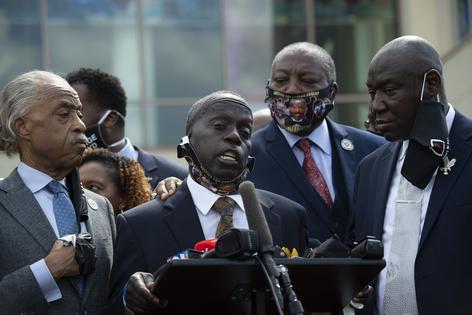Two Racially Inflamed Murder Cases Challenge Our Sense of Racial Progress
Trials are a contest between dueling narratives.
In the two racially charged murder trials that have gripped the nation in Wisconsin and Georgia, the narratives also stage a contest between facts and truth, inflamed by legacies of the nation’s troubled history with race.
With that in mind, I felt a poignant sense of deja vu when I saw the Rev. Jesse Jackson show up at the Brunswick, Georgia, trial of the three men accused of killing Ahmaud Arbery.
It felt like old times. I’ve been covering Jackson, as a reporter or a columnist, for so many decades that he once joked that I deserved some sort of an award. Perhaps an old shoe, I suggested, for all the times he might have wanted to kick me for the stories he was not happy about.
But, now that I have the luxury of being able to say what I really feel, I was delighted to see that at age 80, the “Country Preacher” was still on the case, despite his Parkinson’s disease, his recent hospitalization for a fall and his hospitalization along with his wife in August after testing positive for COVID-19.
Nothing could keep him away from sitting with Arbery’s family, he said, after defense attorney Kevin Gough tried to have “Black pastors” such as the Rev. Al Sharpton, who attended days earlier, removed from the courtroom, “with all due respect,” to avoid unfairly influencing the jury.
The Black pastors symbolized the prominent role that race has played in the case. The three defendants in the case are white, as are 11 of 12 jurors after defense attorneys’ challenges removed 11 of a dozen potential Black jurors.
Citizen’s arrest laws, which predate the nation’s founding, allowed colonial citizens to detain someone they had seen commit a crime. Georgia, along with other states mostly in the South, expanded those laws, partly to aid catching runaway slaves.
Republican Gov. Brian Kemp championed the repeal of its citizen’s arrest law after Arbery’s death amid the wave of racial reckoning that followed the death of George Floyd.
With Kemp’s signature, Georgia becomes the first state to remove a citizen’s arrest statute from its books. All 50 states have a version of the law in place, according to the Atlanta Journal-Constitution. Lawmakers in South Carolina and New York have introduced similar measures.
...continued
(c) 2021 CLARENCE PAGE DISTRIBUTED BY TRIBUNE MEDIA SERVICES, INC.










